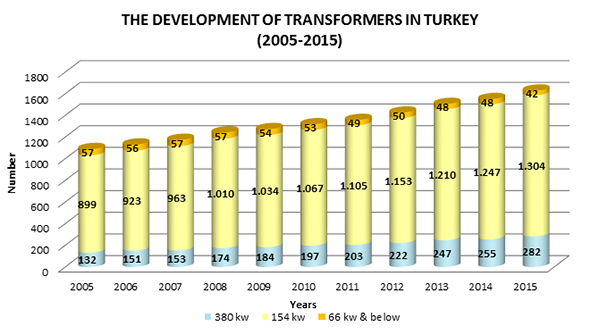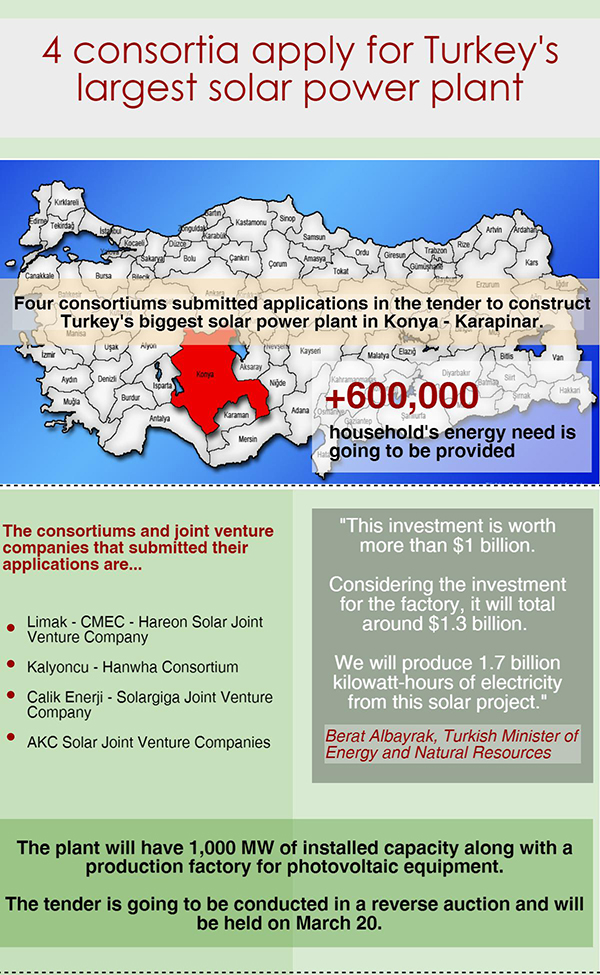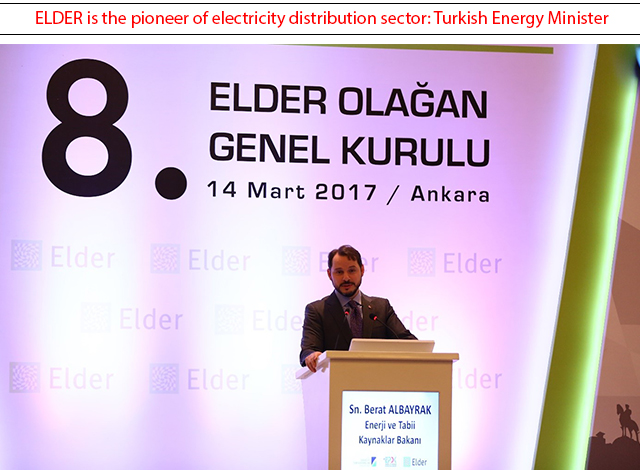
Berat Albayrak, Turkish Minister of Energy and Natural Resources, stated that ELDER - Association of Electricity Distribution System Operators, has an important role in the electricity distribution sector to ensure better quality and more professional and institutional framework in the sector. Albayrak underlined that ELDER is also prominent being the pioneer of the sector.
The 8th Regular General Assembly of ELDER was held at Swiss Hotel with the participation of Berat Albayrak- Turkish Minister of Energy and Natural Resources, Fatih Dönmez- Undersecretary of Ministry of Energy and Natural Resources, Mustafa Yılmaz-President of Energy Market Regulatory Authority (EMRA), Halil İbrahim Leventoğlu-General Manager of Turkish Electricity Distribution Inc. (TEDAS), members of Management Board of ELDER and top managers of public and private sectors.
Berat Albayrak, the Minister of Energy and Natural Resources, who made the opening speech of the General Assembly, noted that ELDER has an important role in the electricity distribution sector to ensure better quality and more professional and institutional framework in the sector. Stating that they will announce the questionnaires for the sector in the Sector Meeting to be held by ELDER within this year again, Albayrak said that “Questionnaires are on the way. I guess we will hold them after the elections. We will check and review the last past year. In the 21 distribution regions, we will consult with our managers and professionals who work to make this sector better and provide better quality service to the citizens. We will make it happen through shared wisdom. ELDER and ELDER General Assemblies are important in this respect, being the pioneers of our sector. We are taking many steps in energy markets aimed at liberalization and reaching a better quality and institutional sector. This is why ELDER is important”.
“Hopefully we will achieve our targets in 2017”
Stating that the year 2016 was a year in which significant steps were taken in the electricity distribution sector compared to the year 2015, Minister Albayrak added that unfortunately they could not reach the desired level yet. He said, “I hope we will achieve our targets with regard to investment, customer services, customer satisfaction and institutionalization in 2017. We have set important targets to put local and regional investments into action in terms of both call centers and technical satisfaction. We will follow them up more closely in 2017.”
Underlining that in 2016 significant steps were taken in terms of the principle of “domestic and national energy”, Minister Albayrak noted that the share of domestic resources in electricity generation reached a record level of 49 percent. Albayrak said that these developments will contribute positively to the contraction of Turkey’s current deficit. “In the year 2016, the share of domestic coal in electricity generation has increased by 23 percent, and the share of renewable resources has increased by 31 percent.” he said.
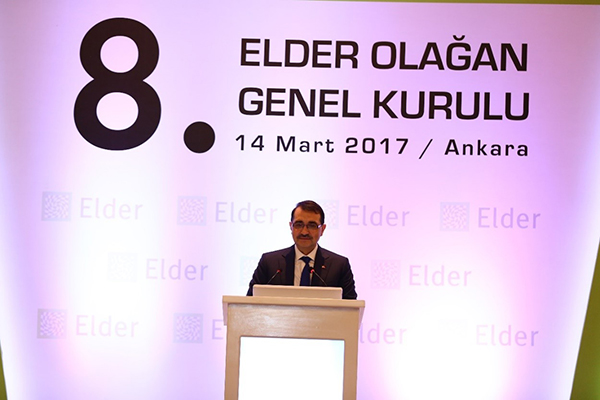
Dönmez: “The sector has a huge responsibility”
Fatih Dönmez, Undersecretary of the Ministry of Energy and Natural Resources, emphasized that the electricity distribution sector has reached a good level after privatization and will be even better in the upcoming period. Noting that all stakeholders in the distribution sector should respect each other’s business, Dönmez continued as follows: “In the distribution sector, you are doing a job in which the product is consumed immediately. You do not have the chance to say sorry. In this sense, the sector has a huge responsibility. We will pay more attention to infrastructure system. We should make sure that the infrastructure coordination centers are more active in the new period.”

Yılmaz: “If the consumer is not happy, you can not be happy”
Mustafa Yılmaz, Chairman of the Energy Market Regulatory Authority (EMRA) expressed that electricity distribution service is a difficult one due to its technical processes just like generation and transmission. Yilmaz underlined the importance of the cooperation between private companies and the public, and said the following:
“In this industry, we are like an entire body from consumers to company owners. Therefore, without challenging each other we all need to act to ensure this service uninterruptable with high quality. If the consumer is not happy, you will not be happy.”
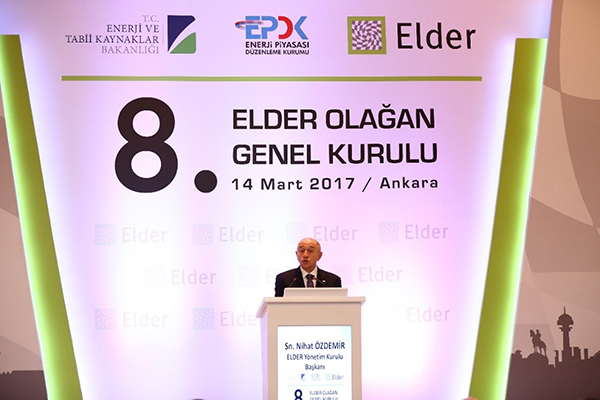
Özdemir: “Privatizations proved to be very successful”
Nihat Özdemir, during his last speech as the Chairman of ELDER stated that, privatizations and technical & non-technical loss comes to mind when people talk about electricity. Özdemir emphasized that privatizations were very successful in the electricity distribution sector and reminded that according to the High Planning Board decision also known as the 2004 Privatization Strategy Document, the benefits expected from the privatizations were “an increase in the investments”, “ensuring supply security and service quality” , “reducing technical &non-technical losses” and “ensuring that the consumers use cheaper electricity”.
Pointing out that the average annual investment between 1995 and 2005 during the public period amounted to 1,5 billion TL, Özdemir explained the following: "I would like to give the 2017 February figures excluding the inflation effect. 2015 investments of the privatized distribution companies were approximately 4,5 billion TL. Their 2011-2015 average is approximately 3 billion Liras.
The figures are even more impressive in energy generation investments. As you know, in the last 5 years our installed capacity has increased more than two times. All of these investments exceeding 50 billion dollars, was made by the private sector. Was supply security ensured? Absolutely. Today the installed capacity of Turkey reached 80 thousand megawatts. Considering the ongoing investments and the maturity of the market, it seems like Turkey will not have any concerns about supply security."
Özdemir emphasized that non-technical losses decreased after privatization. He said that, before privatization non-technical losses in electricity was 25 percent in average throughout the country, but now it is below 15 percent. Özdemir said that “Rapid improvements are observed especially in the regions with high non-technical loss figures. Excluding these areas, the figures for non-technical losses reached to 8 percent, which is the average of the OECD countries”. Özdemir said that as a result of all these developments, the consumers are using cheaper electricity.








